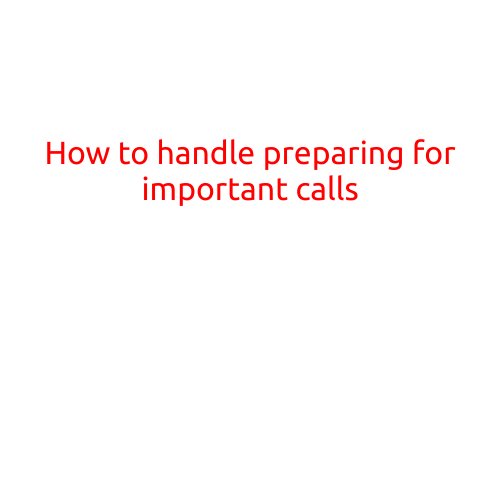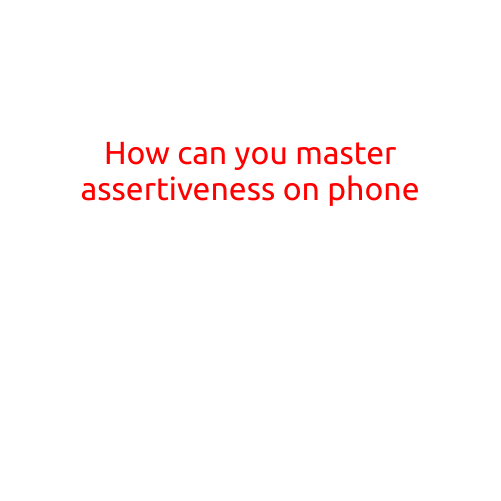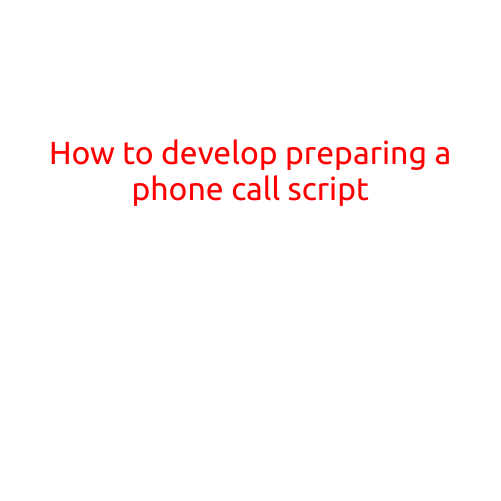
How to Handle Preparing for Important Calls
As a professional, you likely receive countless phone calls every day. However, some calls require more preparation than others. Important calls can be nerve-wracking, especially if they involve critical decisions or sensitive topics. To ensure you’re adequately prepared, follow these tips on how to handle preparing for important calls.
1. Gather Information and Background
Before making or taking an important call, gather as much information and background as possible. This includes:
- Reviewing relevant documents, reports, and data
- Brushing up on previous conversations or meetings related to the topic
- Researching any new developments or updates on the issue at hand
- Anticipating potential questions or concerns
Having a solid understanding of the topic will help you stay focused and composed during the call.
2. Identify Your Objectives
Determine what you want to achieve from the call. Are you looking to:
- Resolve a specific issue?
- Discuss a new opportunity?
- Build a relationship with the caller?
- Request support or resources?
Having clear objectives will help you stay on track and ensure you’re prepared to address key points.
3. Prepare Questions and Notes
Develop a list of thoughtful questions to ask the caller. This will help you:
- Clarify their concerns and needs
- Gather additional information
- Address potential misconceptions
- Show you’re interested in their perspective
Also, take notes during the call to reference later. This can include:
- Key points discussed
- Action items or next steps
- Follow-up tasks or appointments
4. Choose the Right Environment
Select an environment that promotes focus and minimal distractions. Consider:
- Noise level: Find a quiet spot to minimize background noise
- Visual distractions: Avoid areas with TVs, computers, or chatty coworkers
- Comfort: Choose a comfortable setting that won’t make you anxious or uncomfortable
5. Practice Your Communication Skills
Important calls require effective communication. Practice active listening, clarity, and concision. Consider:
- Using a calm and professional tone
- Avoiding jargon or technical terms
- Breaking complex information into simple, easy-to-understand parts
6. Anticipate Emotions and Reactions
Some calls may involve sensitive or emotional topics. Anticipate potential reactions and be prepared to:
- Empathize with the caller’s perspective
- Provide reassurance and support
- Take a calm and composed approach
7. Follow Up and Follow Through
After the call, take action on any agreed-upon tasks or next steps. This demonstrates your commitment to resolving the issue or moving forward.
8. Review and Reflect
After the call, take time to review what was discussed and reflect on what went well or could be improved. Use this opportunity to:
- Identify areas for improvement
- Develop strategies for future calls
- Preserve valuable insights and lessons learned
By following these tips, you’ll be better equipped to handle important calls with confidence and professionalism. Remember, preparation is key to achieving your objectives and building strong relationships with callers.
Conclusion
Preparing for important calls requires careful planning, attention to detail, and effective communication skills. By gathering information, identifying objectives, preparing questions and notes, choosing the right environment, practicing communication skills, anticipating emotions and reactions, following up and following through, and reviewing and reflecting, you’ll be well-prepared to handle even the most critical calls.





